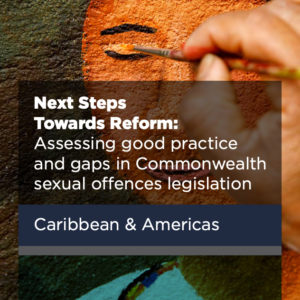Antigua and Barbuda’s sexual offences laws are in the Sexual Offences Act 1995 (SOA). The Act was last amended in 2004, however no substantive change to the relevant provisions was made.
The legislation does not reflect good practice or international human rights standards. In particular, rape is narrowly defined as penile penetration of a vagina, and marital rape is not an offence except in the narrow circumstances where the parties are divorced, separated by order or agreement or there is an order in place against the husband. There are child sexual assault offences, however, they are not comprehensive. They are also weakened by inadequate close-in-age exceptions necessary to avoid criminalising young people and children who engage in consensual sexual activity with their peers. The age of consent is 16. The legislation also criminalises sexual intercourse with a woman who has an intellectual disability, using the derogatory term ‘mentally subnormal.’
In a positive development, Antigua and Barbuda has begun a process of reviewing the Sexual Offences Act as part of a 5-year Caribbean regional justice sector reform project funded by the Canadian government (IMPACT Justice). The Government indicated, however, that the review would not include the offences of buggery and serious indecency, which criminalise same-sex sexual activity, in violation of international human rights law and contrary to good practice. In 2022, however, the High Court struck down the provisions criminalising same-sex activity insofar as they applied to consensual acts conducted in private between persons above the age of consent. Section 12 (Buggery) and section 15 (Serious Indecency) of SOA remain on the statutes to criminalise non-consensual same-sex activity and same-sex activity with a minor. This is counter to good practice and all non-consensual sexual acts, including anal ‘rape’, should be included in the standard sexual assaults provisions, such as ‘rape’ and ‘sexual assault’, as well as in child sexual offences. All of these crimes should be gender-neutral.
Antigua and Barbuda is a state party to relevant international and regional human rights treaties, including the Inter-American Convention on the Prevention, Punishment, and Eradication of Violence against Women (Convention of Belém do Pará), Convention on the Elimination of All Forms of Discrimination against Women, Convention on the Rights of the Child, the Convention on the Rights of Persons with Disabilities, Convention against Torture and Other Cruel, Inhuman or Degrading Treatment or Punishment and International Covenant on Civil and Political Rights.
The full assessment of Antigua and Barbuda is available here.



